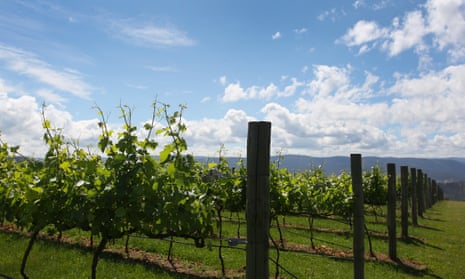China has dropped tariffs on Australian wine, a long-awaited decision heralded by the Albanese government as validation of its “calm and consistent approach” with the superpower on a series of controversial trade disputes.
In a statement on Thursday the prime minister, Anthony Albanese, foreign minister, Penny Wong, and trade minister, Don Farrell, said they had been informed that from Friday, China’s duties on Australian bottled wine would come to an end. Australia would, in turn, discontinue its legal proceedings in the World Trade Organization, the government said.
“We welcome this outcome, which comes at a critical time for the Australian wine industry. The re-entry of Australian bottled wine into the Chinese market will benefit both Australian producers and Chinese consumers,” the joint statement read.
“This outcome affirms the calm and consistent approach taken by the Albanese Labor Government and follows the success of the similar approach taken to remove duties on Australian barley.
“We acknowledge and thank Australian grape growers and wine producers for their fortitude and support during a challenging period.”
Chinese-based media reported that the country’s commerce ministry had released a statement saying it was no longer necessary to impose “anti-dumping” and anti-subsidy duties on Australian wine.
Beijing in 2020 had imposed tariffs of above 200% on Australian wine products, at the height of the diplomatic dispute between the two countries. The Australian government statement said this had “effectively made it unviable for Australian producers to export bottled wine to that market” – scuppering an export market worth $1.1bn to Australia in 2019.
Guardian Australia understands the Chinese ambassador to Australia, Xiao Qian, met Farrell at Parliament House late Wednesday to discuss the trade issues.
The end of March was the original deadline for Beijing to decide whether to remove the prohibitively high tariffs. Earlier this month, the Chinese commerce ministry published an interim decision suggesting the tariffs were likely to be scrapped. Under last year’s “off-ramp” deal, Australia suspended its complaint against China at the World Trade Organization in return for China agreeing to fast-track a review of the tariffs by the end of March.
Albanese had earlier on Friday all but confirmed the tariffs were about to cease, claiming the end of the dispute was “imminent” and “pretty close”.
“China wants good high-quality wine, and Australia produces it in places like Hunter Valley, as well the Barossa, through the Clare and even down near Canberra around Murrumbateman, across to Margaret River, down in Tassie. It’s such a great industry, it employs hundreds of thousands, if you take into account tourism, if we take into account everything else that comes from here,” the PM said from a winery in the Hunter region.
after newsletter promotion
“Now, when the impediments to trade with China were put in place, the trade was worth, in 2019, $1.1bn every year. Now, we reckon that the resumption of trade, which we think is imminent, will see an even higher amount.”
Albanese said the government would continue pushing for an end to the remaining Chinese tariffs, such as those on lobster and beef.
“The Australian Government’s approach is to cooperate with China where we can, disagree where we must and engage in our national interest – the outcomes on barley and wine reflect that approach,” Albanese, Wong and Farrell said.
“We will continue to press for all remaining trade impediments affecting Australian exports to be removed, which is in the interests of both Australia and China.
“Trade diversification is a key element of the Government’s trade policy strategy. The Government will continue to support Australian businesses to sell their world-class products on the global stage.”
